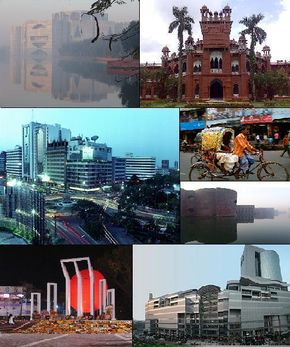Exchange Rate Home >> Foreign Exchange Cities >> Dhaka
Exchange Rate Dhaka
Use the currency converter below to calculate the current exchange rate for the city of Dhaka. The currency used in Dhaka is the Taka. Dhaka is the capital of Bangladesh.
If you are traveling to Dhaka, you will need to exchange your currency for the Bangladeshi Taka. You may exchange your money for the Taka at most Dhaka banks or at specialized stores called Foreign Exchange Bureaus. Look for signs that say Bureau De Change, Geld Wechseln or Cambio. You may be able to exchange your money at the Dhaka airport, but exchange rates may not be the best. You should consider purchasing the Taka currency at a more favorable exchange rate before you arrive in Dhaka. You can do that by researching online currency brokers that do foreign exchange. If on holiday, vacation, or business you can also inquire about purchasing travellers checks (Travellers Cheques). Also, before your trip, consult with your credit or debit card bank about the foreign exchange transaction fees charged for using your card in Dhaka, Bangladesh.

About Dhaka
Dhaka (Bangla: ঢাকা, pronounced [ˈɖʱaka]; formerly known as Dacca and Jahangir Nagar, under Mughal rule), is the capital of Bangladesh and the principal city of Dhaka District. Dhaka is a megacity and one of the major cities of South Asia. Located on the banks of the Buriganga River, Dhaka, along with its metropolitan area, has a population of over 15 million, making it the largest city in Bangladesh. It is the 8th largest city in the world and also among the most densely populated cities in the world. Dhaka is known as the City of Mosques and renowned for producing the world's finest muslin. Dhaka is also known as the Rickshaw Capital of the World. Approximately 400,000 cycle rickshaws run each day. Today it serves as one of the prime centres for culture, education and business in the region.
Under Mughal rule in the 17th century, the city was known as Jahangir Nagar. It was a provincial capital and a center of the worldwide muslin trade. The modern city, however, was developed chiefly under British rule in the 19th century, and became the second-largest city in Bengal after Calcutta (presently Kolkata). After the Partition of Bengal in 1905, Dhaka became the capital of the new province of Eastern Bengal and Assam but lost its status as a provincial capital again after the partition was annulled in 1911. After the partition of India in 1947, Dhaka became the administrative capital of East Pakistan, and later, in 1971, the capital of an independent Bangladesh. During the intervening period, the city witnessed widespread turmoil; this included many impositions of martial law, the declaration of Bangladesh's independence, military suppression, devastation during war, and natural calamities.
Modern Dhaka is the center of political, cultural and economic life in Bangladesh. Although its urban infrastructure is the most developed in the country, Dhaka suffers from urban problems such as pollution, congestion, and lack of adequate services due to the rising population. In recent decades, Dhaka has seen modernization of transport, communications and public works. The city is attracting large foreign investments and greater volumes of commerce and trade. It is also experiencing an increasing influx of people from across the nation, this has made Dhaka the fastest growing city in the world.
|
 |
View Currency Money Information for:
|
 |
View Currency ISO Information for:
|
 |
Information about countries that use the US Dollar Currency:
|
 |
Flags for countries that use the US Dollar Currency:
|
The text on this page has been made available under the Creative Commons Attribution-ShareAlike License and Creative Commons Licenses
|
